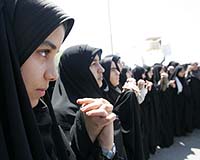| . |  |
. |
London (AFP) Dec 14, 2009 Iran is working towards testing a key final component of a nuclear bomb, British newspaper The Times said Monday, citing confidential documents. The daily said it had obtained notes describing a four-year plan to test a neutron initiator, the component of a nuclear bomb which triggers an explosion. The Times claimed that foreign intelligence agencies dated the documents to early 2007 -- four years after Tehran was thought to have suspended its weapons programme. The technical document describes the use of uranium deuteride -- a neutron source, said the newspaper. Uranium deuteride is thought to have no possible civilian or military use other than in a nuclear weapon. In the view of experts contacted by the newspaper, Iran's work in this field "has no possible civilian application. It makes sense only for a programme to develop a nuclear weapon," the Times said. A picture of the document, written in Farsi, was printed inside the newspaper. The Times said the documents detailed a plan to test whether the device works -- without leaving traces of uranium that the outside world could detect. A spokesman for Britain's Foreign Office said: "We do not comment on intelligence, but our concerns about Iran's nuclear programme are clear and based on information in the public domain. "The International Atomic Energy Agency (IAEA) has made clear that it cannot verify Iran's nuclear programme is for exclusively peaceful purposes," he added, saying the recent revelation of a facility at Qom "was further blow to confidence and trust in Iran's intentions." Iran, which is already enriching uranium in defiance of UN sanctions at a plant in Natanz, revealed in September it had been building a second uranium enrichment plant inside a mountain near the Shiite holy city of Qom. The disclosure of its existence triggered widespread outrage in the West, which suspects Iran is developing technology to enrich uranium to highly refined levels to covertly build a nuclear bomb. Tehran vehemently denies the charge, saying its nuclear programme is for peaceful purposes only. Iran is under three sets of sanctions for refusing to halt enrichment. Mark Fitzpatrick of theInternational Institute for Strategic Studies think-tank, told the Times: "The most shattering conclusion is that, if this was an effort that began in 2007, it could be a casus belli. "If Iran is working on weapons, it means there is no diplomatic solution. "Is this the smoking gun? That's the question people should be asking. It looks like the smoking gun. This is smoking uranium."
earlier related report "It's been decided that because of a scheduling difficulty, it won't be possible this year," State Department spokesman Ian Kelly told reporters. Kelly said the United States was "ready to do it" but would not say which of the US negotiating partners -- Russia, China, Britain, France and Germany -- could not attend such a meeting. However, a State Department official later told reporters on the condition of anonymity that China had the scheduling problem. "The Chinese said they couldn't work it into their schedule, they couldn't come on December 18," according to the official. The official said the meeting had been planned for Brussels. But the official also said that the political directors of the six countries were now discussing plans for a teleconference call on Iran, probably by next week. President Barack Obama's administration in the last few days has been turning up the heat on Iran, warning of "credible consequences" if Tehran continues to defy international demands to curb its nuclear ambitions. With a year-end deadline, the administration signaled that time is running out for Iran to seize its offer of diplomatic engagement for resolving nuclear and other issues. The administration has raised the specter of a fourth round of UN sanctions, which will require the full support of Britain, France and Germany as well as Russia and China. Russia and China have been more reluctant to impose sanctions on Iran but have recently become increasingly critical of Tehran. Share This Article With Planet Earth
Related Links Learn about nuclear weapons doctrine and defense at SpaceWar.com Learn about missile defense at SpaceWar.com All about missiles at SpaceWar.com Learn about the Superpowers of the 21st Century at SpaceWar.com
 Divided Iran enters 2010 after a year of deadly protests
Divided Iran enters 2010 after a year of deadly protestsTehran (AFP) Dec 13, 2009 A politically divided Iran enters 2010 after a year marked by deadly street protests against President Mahmoud Ahmadinejad - some of the worst demonstrations since the fall of the shah - and tensions with the West over its nuclear programme. The protests, which erupted after Ahmadinejad's June 12 re-election, shook the pillars of the 30-year-old Islamic regime, divided its clerical elite ... read more |
|
| The content herein, unless otherwise known to be public domain, are Copyright 1995-2009 - SpaceDaily. AFP and UPI Wire Stories are copyright Agence France-Presse and United Press International. ESA Portal Reports are copyright European Space Agency. All NASA sourced material is public domain. Additional copyrights may apply in whole or part to other bona fide parties. Advertising does not imply endorsement,agreement or approval of any opinions, statements or information provided by SpaceDaily on any Web page published or hosted by SpaceDaily. Privacy Statement |